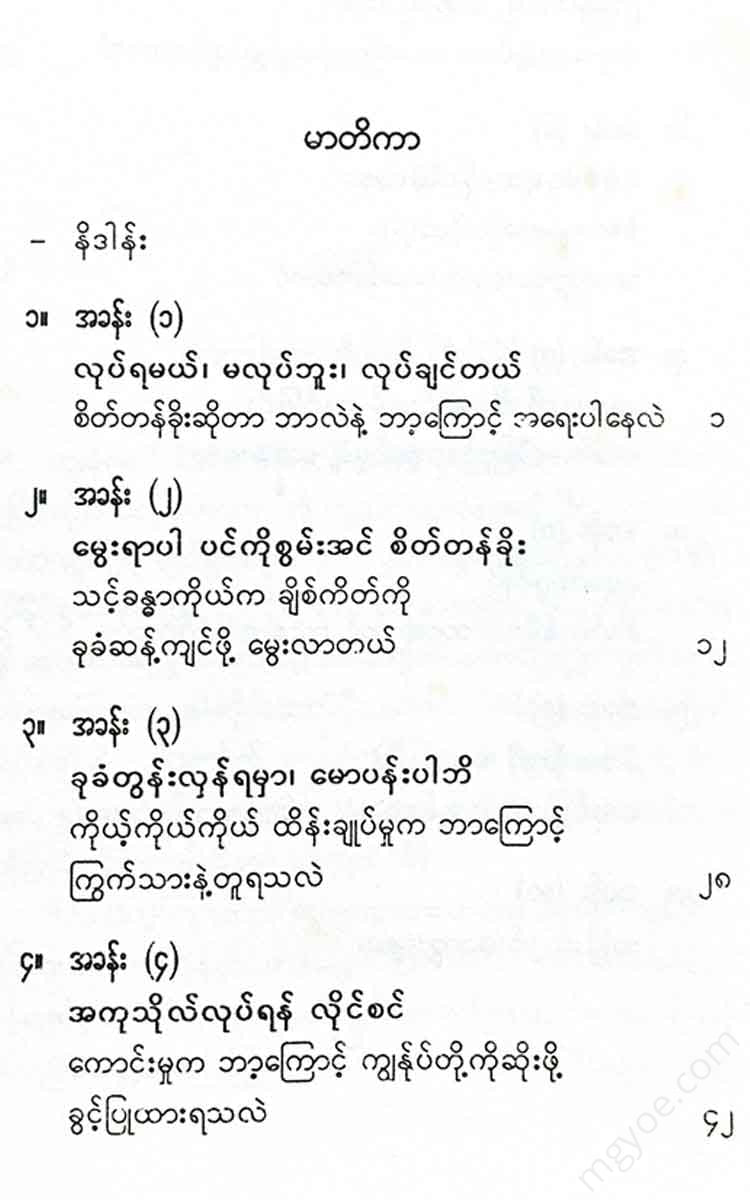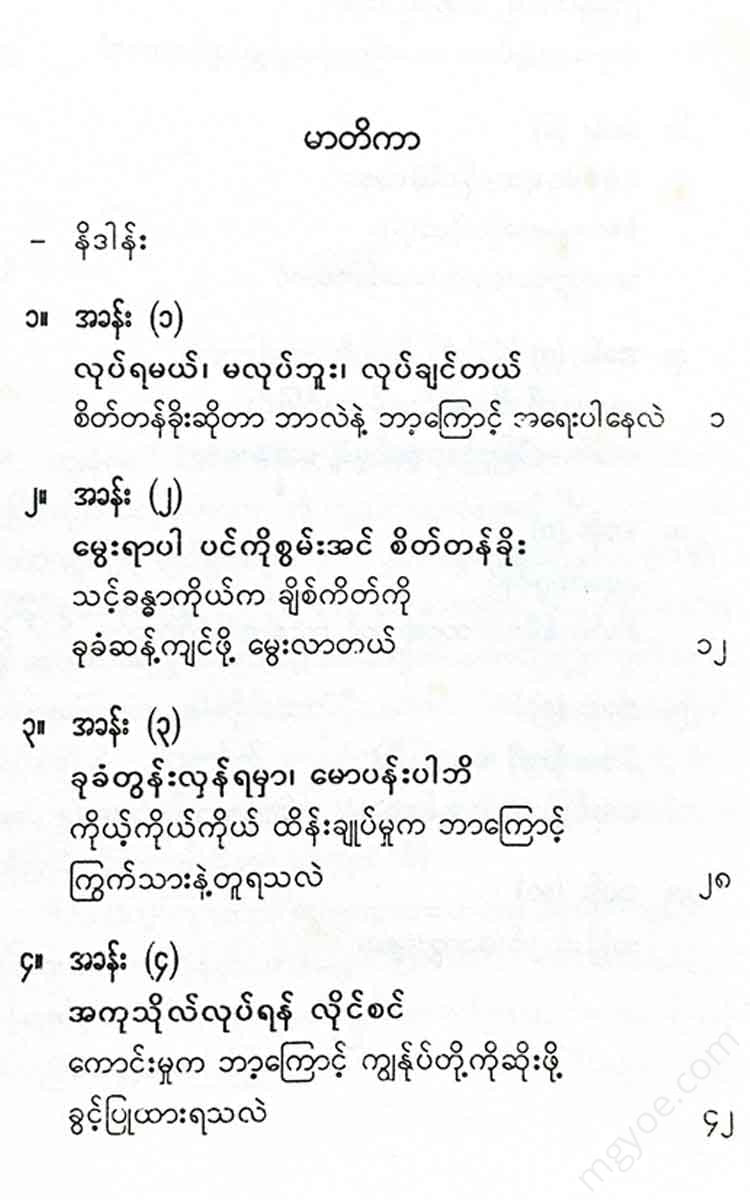စိတ်ကူးချိုချိုစာပေ
Good - Innate, innate, psychic power
Good - Innate, innate, psychic power
Couldn't load pickup availability
Chapter (1)
Should I do it, shouldn't I do it, want to do it?
What is mental strength and why is it important?
The classic test of willpower is resisting temptation. It's the same thing as cutting out your addiction to donuts, cigarettes, alcohol, beer. When people say, "I don't have willpower," what they really mean is, "I have a problem resisting the urges of my body parts, like my stomach, my mouth, my heart." Think about the power of "not doing it."
Refusing to do something is part of the willpower needed. Instead of saying "no," make a list of what you need to do today. Willpower will help you do this. Instead of worrying, playing video games, or getting sidetracked, run a marathon. Think about the willpower to do only the things you "have to do."
The “must do” and “should not do” powers are two sides of the same coin. But having just two of them is not enough to be a power of will. You need a third power. It is to remember what you really want to do. Whenever you are faced with temptation, examine with your brain and conscience whether you really want to do it or not. As you practice this self-control, you will find that what is important is what drives you. This is the third power, “want to do it.”
The power of the mind is tied to three forces: “I have to do it,” “I don’t want to do it,” and “I want to do it.” It is our good fortune that the brain can provide these forces. The only way to avoid losing the power of the mind is to “know yourself.”
Why do you need to have willpower?
Even in the Stone Age, how to make friends and how to influence people are the same today. You have to cooperate while your neighbors protect you. If someone is hungry, you share dinner. In other words, you have to have a little self-control.
This... is the beginning of the need for mental powers that we are talking about now. As history advances, self-control is increasingly required in today's complex social world. We are now responding to this demand. It is these responses that we must control, and that is why we have mental powers.
The neuroscience of what we should, shouldn't, and want to do
Before we get into the power of the mind, let's look at neuroscience first. The modern powers of self-control are already embedded in the human brain. The prefrontal cortex, located just behind our foreheads (shown in the picture), is where the three powers discussed in the previous chapter on the power of the mind are located. According to Evolv's history, this prefrontal cortex primarily controls physical movements, such as walking, running, and pushing. As humans evolved, this prefrontal cortex became more connected to other areas of the brain and became a larger area. These developed brain areas are responsible for controlling functions. It controls what you pay attention to, what you think about, and how you feel.
Stanford University neuroscientist Robert S. Poesky says the main job of the modern prefrontal cortex is to motivate the brain to do more difficult tasks, such as sitting in a reclining chair and doing strength training exercises.
I don't do it.
Must do
I want to do it.
The power of the mind from the brain
The upper left side of the frontal lobe is associated with the “must do” mentality. This includes more difficult, stressful tasks, and choosing responsibilities. The upper right side of the frontal lobe is associated with the “not do” mentality. Attention
It works by withdrawing from the impulses and desires of the body. The area of the frontal lobe, located at the bottom of the middle of the brain, is associated with the power of the will. It is where your goals and true desires are located. The faster the cells in this area fire, the more you are driven to resist the urges. It is the part that constantly reminds you of what you really “want to do.”
Brain damage resulting in loss of mental power, a fatal incident
How important are the frontal lobes of the brain in self-control? I'll tell you a true story of how these frontal lobes of the brain were damaged by an accident. "The true story of Phineas Gates."
In 1848, Phineas Gates was a 25-year-old foreman on a railroad construction site. He was respected and loved by his colleagues. He was a quiet, easy-going man. His doctor said he was strong in both body and mind, “with a mind of steel and a frame of steel.”
But on September 13, while digging a mine to build a railway, the mine exploded prematurely, killing 3 feet 7 inches.
A long nail pierced Gates' head, penetrating his left cheek and sending his prefrontal cortex flying 30 yards to the ground. The surgery for the injury took over two months. The superficial nerve seemed to have healed, and he was able to return to work.
But something strange was happening to Gates' brain. Colleagues said his personality had completely changed. His intelligence and animal-like reflexes had been destroyed. Acquaintances and friends said that he was no longer the "Gates" he had been.
Gates lost his mental powers because the front part of his brain was missing. His steely mind was shattered by the loss of the front part of his brain, which caused his skull to split open, and his personality was destroyed.
The problem of two minds
We have one brain, but two minds. It's as if there are two people inside our own self. The mind that wants to act on the impulses of the nerves, and the mind that wants to control these impulses. We are torn between these two minds, or two selves.
Here we can define the challenge of mental power. While one part of you wants one thing, another part of you wants this other thing. Your present,
Self-discipline
Ability to control one's temper
Your ego wants one thing, but your future ego wants something else. When these two egos disagree, one starts to overpower the other.
Your two minds have met under the microscope.
In every mental strength challenge, two parts of a person's ego are in conflict. The desire to be free from impulses and the desire to be more rational and not lose control. If we had to name these two, the first would be called the "cooking ghost" and the second the "analyzer." To strengthen mental strength, we must support the "analyzer."
The value of both selves
So, should we completely eliminate the unsupported “cookie ghost” of neural stimulation? This is not necessary. For example, we can take the case of a girl who was accidentally deprived of her brain during brain surgery. This girl lost two emotional abilities: fear and disgust. As a result, she no longer felt disgust or dislike, and she became fat when she was sexually aroused. Another strange thing is that she proposed to have sex in front of her family members. This is not a form of self-control at all.
The neural impulses that we call the animal mind are necessary. The survival instincts and the self-control system do not conflict. In some cases, they work together to make good decisions. We need neural impulses from the beginning to be human. We need the desire to find appropriate pleasures that support our goals.
Training your brain for mental strength
The human brain is structurally dead. They say it can't develop any further. Neuroscientists have found that the more the brain is trained, the better it can recognize responses. If you do math every day, you'll get better at math. Every day, you worry.
If you have a lot of stress, you're more likely to be anxious. If you focus your brain more, your focus will be sharper.
Some parts of the brain become denser. Just as mice grow, they tend to pack more gray matter into bundles. For example, playing memory games for 25 minutes a day increases the number of connections between areas of the brain that are important for attention and memory.
You will have to train your brain to be more self-controlled. The simplest and most painless way to practice is to practice mindfulness meditation, also known as mindfulness of the in-breath, or anāpāna. It is not meant to be a lifelong practice. Even the smallest, shortest meditations are very beneficial.
Just three hours of meditation has been shown to improve self-control and self-care. Eight weeks of daily meditation can improve self-awareness and self-care in everyday life.
Mental strength test, 5-minute brain training meditation
Mindfulness is a simple and powerful way to train your brain and increase your mental strength. It reduces stress and teaches your mind how to deal with internal distractions (hunger, cravings, anxiety, and cravings) and external stimuli (sounds, sights, smells, etc.). New research shows that regular meditation can help you feel more alert and focused.
While practicing, I quit smoking and drug addictions and cleansed myself. Whenever I face the challenge of “should” or “shouldn’t,” this 5-minute meditation is a powerful, empowering brain exercise. How to get started...
1. Sit still and take a position.
Sit upright, either on the floor, on a cushion, or in a chair, with your hips crossed and your back straight. Place both hands on your thighs. If you are experiencing itching, adjust your sitting position to make it more comfortable. Once in this position, focus on your inhales and exhales, and then hold your breath as the itching subsides.
2. Close your eyes as you breathe in and out carefully. Breathe in,
Exhale. Focus on the air entering and leaving the tip of your nose.
3. Observe your breathing, control your mind's wandering. You can focus on the chest or rib cage expanding as you inhale, contracting as you exhale, or contracting and contracting. While observing your breath, if you find yourself thinking about something, control your attention to stay on the breath. This exercise not only strengthens self-control but also strengthens self-awareness. Keep in mind the meditation motto, "Be aware of the breath."
Start with 5 minutes a day. Once you get used to it, increase it to 10 to 15 minutes. If it gets too much, reduce it back to 5 minutes. The best time to do it is around 5 am. If this time is too difficult for you, you can do it at any time during your free time.
“Meditation doesn’t mean you have to stop all your thoughts. It’s just learning not to be distracted by them. Don’t lose sight of your goal. It doesn’t matter if your concentration isn’t perfect. Just focus on your breath.”









